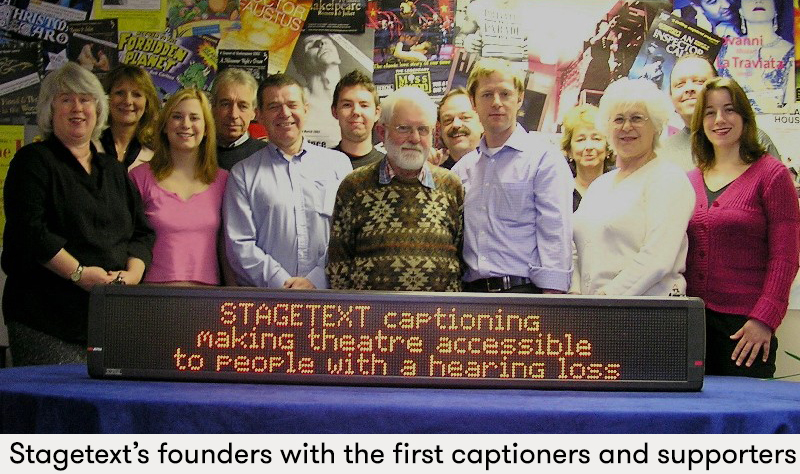On 15 November 2000, we delivered our first ever captioned performance, 18 years later we’re celebrating over 1000 events a year.
That first captioned performance of the Duchess of Malfi by the RSC at the Barbican was a seminal moment in the history of access for d/Deaf, deafened and hard of hearing people. But it was a personal moment too: during this Captioning Awareness Week we have been repeatedly told by our earliest users that, “I was there – and it changed everything”.
Stagetext was founded in 2000 by Peter Pullan MBE, Merfyn Williams and Geoff Brown, who each had varying types of deafness. They recognised that a growing number of people were unable to enjoy live theatre in the UK due to a lack of access. Their priority was for d/Deaf, deafened and hard of hearing people to experience the arts as fully as a hearing audience member. You can watch Peter talking about it first-hand.
In order to provide this access, our co-founders brought the first open captioning box from the USA to the UK. Along with Stagetext’s very first captioner, Lynn Jackson, they worked out not just how to use the box to display text, but how to format and cue the text of the play in the most accessible way: verbatim, with character names and sounds included, all cued perfectly in time with the actors’ speech.
Today, Stagetext works with over 120 theatres and captions more than 350 shows a year as well as supporting a further 200 captioned performances delivered in-house. Stagetext continues to embrace technological advances and you can now enjoy culture in new ways – including digital subtitling, the live subtitling of talks and tours in museums and galleries, not to mention post-show talks at the theatre.
This week we are celebrating Captioning Awareness Week to spread the word to audiences and venues alike. On Monday, I presented to over 100 industry professionals on developing audiences through great access. In my opening speech my mantra was “one size doesn’t fit all”. Different venues and different productions can be made accessible in different ways. Although we always recommend open captioning, there are times and places when closed captioning is a great solution too.
We advise that every run of a show should have a minimum of two open captioned performances during a three-month period. We are always striving for more captioned performances, and theatres are rising to the challenge – the Royal Court Theatre earlier this month announced that they will caption all of the shows in their Spring/Summer season once a week. And we are currently working with the National Theatre on their ‘smart captioning glasses’ which deliver automated closed captions. The glasses will be available for every performance in the National Theatre’s 2019 season, enabling far greater choice for d/Deaf, deafened and hard of hearing audiences than ever before.
Stagetext is proud to be a d/Deaf-led charity and we have always put d/Deaf, deafened and hard of hearing audiences at the heart of the organisation. So today on our 18th birthday I’d like to say a huge thank you to our founders, our captioners, our technical support, our fantastic staff and Board, our User Panel and Ambassadors, and everyone who has made Stagetext such a great success. Here’s to the next 18 years!
Melanie Sharpe, Stagetext CEO




